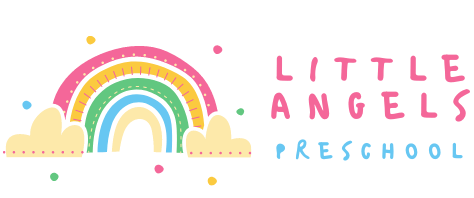Curriculum at Little Angels Preschool
A Faith-Based Curriculum
Our curriculum seeks to improve your child's education and performance in six basic skill areas: motor, sensory, creativity, language, self-concept, and socialization. We plan lessons around your child's interests, and we also incorporate stories from the Bible in our teaching so our little angels learn God's word in addition to reading, writing, and mathematics.
-
Reading
Children develop their literacy skills throughout the day--not only at scheduled reading times. We read poems, songs, and rhymes aloud that teach topics across all subjects. The classroom is filled with signs and labeled objects which help the children make connections.
Here are some suggestions for how to best help your child prepare for the curriculum!
In order to build reading skills with your child:
- Recite rhymes, songs, and poems
- Read, listen to, and talk about books
- Surround your child with words and label objects
Reading activities suitable for home and school:
- Make Character Puppets: Create sock or brown paper bag puppets of characters from your favorite books. Use the puppets to act out stories together!
- Make Up Stories: Encourage your child to use their imagination. Make up stories together. Write them down to share later!
- Use a Computer: Identify and practice typing letters, names, and words.
- Make Letter Cookies: Roll out cookie dough into letters. Spell out your child's name and other fun words!
- Rhyme Time: Play a game in which you take turns saying words (both real and nonsense), thinking up as many rhymes as possible between turns!
-
Writing
Early writing skills are developed through our many arts and craft projects. As your child paints, draws, cuts, sticks, and glues, they develop the strength and fine motor skills that will prepare them for the rest of their scholastic career. Likewise, the reading your preschooler does is directly connected to developing their writing and literacy skills.
Here are some suggestions for how to best help your child prepare for the curriculum!
In order to build writing skills, children should:
- Practice Writing in Creative Ways: Use sidewalk chalk, paint, a stick in the sand, or even a steamy window to get some practice in.
- Arts and Crafts: The more your child draws, glues, and paints, the stronger their dominant hand becomes. This helps prepare them to use a pencil throughout the rest of their scholastic career. Preschoolers love to glue and cut anything--from googly eyes and shapes to the pictures in magazines!
- Write Letters and Cards: Your child can help you write a letter or card to someone. Decorate it and decide what to write. Let them write their own words and add their own "note;" you can make it fun by letting them draw a picture to go along with it!
- Cut Things: Guide your child in cutting out different shapes from paper, felt, wrapping paper, or other materials. They can also practice cutting objects such as plastic straws. The cutting doesn't have to be perfect--it's just great exercise for the hands!
-
Math
Daily preschool math activities include learning numbers, practicing counting, creating and learning shapes, and working with a calendar. In addition, playing with puzzles, building blocks, and trying new number games can help your child practice and build math skills as they count, manipulate, and work with different shapes, spaces, and sizes.
Here are some suggestions for how to best help your child prepare for the curriculum!
In order to encourage your child's math skills:
- Count everything together.
- Teach them what a number is.
- Help them learn about forms, shapes, and patterns.
- Teach them to measure simple household items, toys, or snacks.
- Show them how to sort, categorize, and compare basic objects.
-
Learning Press - (Orton-Gillingham Approach)
The Orton-Gillingham Approach breaks down words to their phonogram, also known as their sounds. By condensing the spelling of terms to simpler units, children have an easier time comprehending reading and spelling.
The Orton-Gillingham approach is a handy tool that helps children spell and read more easily. Even children with dyslexia or learning challenges are able to benefit from this approach to learning.
Why the Orton-Gillingham Approach works:
- It's multisensory
- It's sequential
- It's incremental
- It's cumulative
- It's individualized
- It's phonic based
- It's explicit
EMAIL US!
First Presbyterian Church, 1350 Amador St.
Vallejo, CA 94590. LIC. # 4483008714
Preschool
All Rights Reserved | Little Angels Preschool
